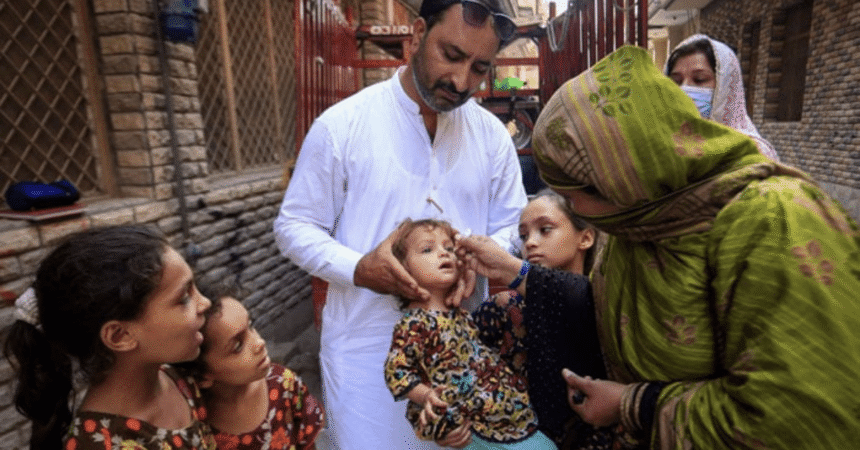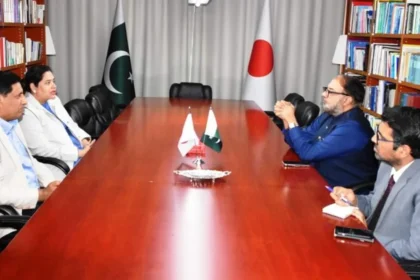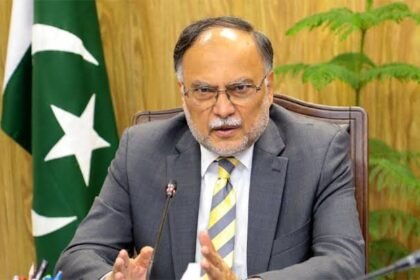Pakistan’s ongoing battle against polio has faced a significant setback with the confirmation of two new cases of the debilitating disease, raising the total number of poliovirus cases to 28 for the year. The two latest victims include a 36-month-old girl from Zhob in Balochistan and a seven-month-old girl from Tank in Khyber Pakhtunkhwa (KP). Both children have been left paralyzed due to the wild poliovirus type 1 (WPV1), highlighting the urgent need for renewed public health efforts in the country.
The Latest Cases
The onset of the virus in the toddler from Zhob was reported on September 6, while the baby in Tank showed symptoms of the virus on September 17. Health authorities confirmed these cases after the Regional Reference Laboratory at the National Institute of Health identified the presence of the poliovirus. Alarmingly, sewage samples from both districts had previously tested positive for the virus, indicating ongoing transmission and significant risks to public health.
This development is particularly troubling in the context of Pakistan’s previous progress in reducing polio cases. The resurgence of poliovirus highlights the fragility of efforts to eradicate this disease and the persistent challenges that health officials face.
Breakdown of Cases by Region
With the recent confirmation of these two cases, the regional distribution of polio cases in Pakistan for the year is concerning:
- Balochistan: 16 cases
- Khyber Pakhtunkhwa (KP): 3 cases
- Sindh: 7 cases
- Punjab: 1 case
- Islamabad: 1 case
Balochistan has emerged as the epicenter of the current polio outbreak, with the highest number of confirmed cases this year. The alarming trend in this region reflects a combination of factors, including low vaccination coverage, insecurity, and public skepticism about vaccination campaigns.
Understanding Polio: The Disease and Its Impact
Polio, or poliomyelitis, is a highly infectious disease caused by the poliovirus. It primarily affects children under five years old and can lead to severe complications, including paralysis, respiratory failure, and even death. The virus invades the nervous system, causing irreversible damage.
How Polio Spreads
The poliovirus spreads through the fecal-oral route, often in areas with poor sanitation and hygiene. It can also be transmitted through contaminated water and food. Once a child is infected, the virus can multiply in the intestines, leading to symptoms that range from mild flu-like signs to severe paralysis.
The lack of vaccination exacerbates the spread of the disease. Malnutrition and underlying health conditions can further compromise a child’s immune system, making them more susceptible to severe outcomes from the virus.
The Importance of Vaccination
Vaccination is the most effective way to prevent polio. The inactivated poliovirus vaccine (IPV) and the oral poliovirus vaccine (OPV) have both proven successful in reducing the incidence of polio worldwide. However, achieving and maintaining high vaccination coverage is critical to preventing outbreaks.
Despite significant efforts to eradicate polio, the disease remains endemic in Pakistan and Afghanistan, making it essential for authorities to implement effective vaccination campaigns.
The Urgent Need for Vaccination Campaigns
In response to the rising number of polio cases, Ayesha Raza Farooq, the Prime Minister’s Focal Person for Polio Eradication, announced a nationwide vaccination campaign scheduled to launch on October 28. This initiative aims to vaccinate millions of children across the country and curb the ongoing transmission of the virus.
Goals of the Upcoming Campaign
The upcoming vaccination campaign has several key objectives:
- Increase Vaccination Coverage: The primary goal is to ensure that all children under five years old receive the polio vaccine, especially in high-risk areas such as Balochistan and KP.
- Community Awareness: Public health officials aim to raise awareness about the importance of vaccination, addressing misconceptions and encouraging community participation.
- Monitoring and Surveillance: Enhanced monitoring of vaccination efforts and ongoing surveillance of polio cases will be critical to identifying and responding to any new outbreaks swiftly.
Engaging Parents and Communities
Farooq has emphasized the importance of community engagement in the fight against polio. She urged parents, community leaders, and teachers to ensure that all children receive the necessary vaccinations. “It is heartbreaking that Pakistani children are still being threatened by a disease that can be easily prevented with the help of an easily available polio vaccine,” she stated.
Public health campaigns are crucial in dispelling myths surrounding vaccinations, which often contribute to vaccine hesitancy. By providing accurate information and fostering trust, health authorities can encourage families to prioritize their children’s health.
Challenges in Polio Eradication Efforts
The resurgence of polio cases in Pakistan is not solely due to the virus itself but is intertwined with several broader challenges that have historically impeded eradication efforts.
Insecurity and Access
One of the significant barriers to vaccination campaigns in Pakistan has been insecurity, particularly in regions like Balochistan and KP. Health workers have faced threats and violence while attempting to administer vaccines in remote areas, leading to decreased vaccination coverage.
Misinformation and Vaccine Hesitancy
Misinformation about vaccines has also fueled public skepticism. Some communities have developed distrust toward vaccination efforts, often fueled by rumors and cultural beliefs. Addressing these concerns requires targeted communication strategies and engagement with local leaders to build credibility.
Poor Health Infrastructure
Pakistan’s healthcare infrastructure faces numerous challenges, including inadequate facilities, shortages of healthcare workers, and logistical difficulties in reaching remote areas. These issues complicate vaccination campaigns and hinder effective public health responses.
The Role of International Cooperation
The global health community has played a vital role in supporting Pakistan’s efforts to eradicate polio. International organizations, including the World Health Organization (WHO) and UNICEF, have collaborated with the Pakistani government to implement vaccination campaigns and improve surveillance systems.
Continued Support Needed
As Pakistan grapples with the challenges of polio eradication, ongoing international support is crucial. Financial resources, technical expertise, and access to vaccines are essential for sustaining vaccination campaigns and enhancing the country’s public health infrastructure.
The commitment of the global community is especially important in light of the recent surge in polio cases. Collaborative efforts can help ensure that Pakistan maintains its momentum toward eradicating polio once and for all.
The Path Forward: Recommendations for Success
The recent increase in polio cases underscores the need for a multifaceted approach to eradication efforts. Several strategies can enhance the effectiveness of vaccination campaigns and ensure the protection of children from this debilitating disease.
Strengthening Surveillance Systems
Enhanced surveillance is crucial for identifying and responding to new cases of polio. Establishing robust monitoring systems can help track vaccination coverage and detect outbreaks early. This proactive approach is essential for preventing the spread of the virus.
Community Engagement and Education
Engaging communities is vital to improving vaccination rates. Public health officials should work closely with local leaders and organizations to raise awareness about the importance of polio vaccination. Tailored communication strategies can help address specific concerns and build trust within communities.
Addressing Barriers to Access
Efforts should be made to address barriers that hinder access to vaccinations, particularly in remote and insecure areas. Increasing the number of healthcare workers, improving transportation infrastructure, and ensuring the safety of vaccination teams are essential steps to reaching underserved populations.
Promoting Health System Strengthening
Investing in healthcare infrastructure and capacity building is crucial for long-term success in polio eradication. Strengthening health systems will not only improve vaccination efforts but also enhance overall health outcomes for communities.
Utilizing Technology
Leveraging technology can enhance the efficiency and reach of vaccination campaigns. Mobile health solutions, data collection tools, and community engagement platforms can facilitate communication and streamline vaccination efforts.
The confirmation of two new polio cases in Pakistan serves as a stark reminder of the challenges that lie ahead in the fight against this preventable disease. With the total number of cases rising to 28, the urgency for effective vaccination campaigns and public health interventions is paramount.
As the nationwide vaccination campaign prepares to launch on October 28, it is crucial for all stakeholders—health authorities, parents, community leaders, and international partners—to work collaboratively to protect the health and future of Pakistan’s children. By prioritizing vaccination, addressing misinformation, and strengthening healthcare systems, Pakistan can move closer to the goal of eradicating polio once and for all.
The fight against polio is not just about preventing a disease; it is about ensuring a healthier future for the next generation. With collective action and unwavering commitment, Pakistan can overcome the challenges it faces and protect its children from the threat of polio.
#PolioEradication #PakistanHealth #VaccinationCampaign #AyeshaRazaFarooq #PublicHealth #ChildHealth #GlobalHealth







